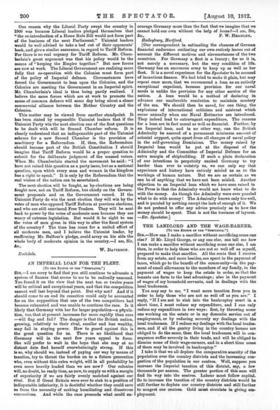AN IMPERIAL LOAN FOR THE FLEET.
[To THE EDITOR OF THE " SPECTATOR."] Sts,—I am sorry to find that you still continue to advocate a system of finance that seems to me to be radically unsound. You found it on the view that the next ten or twelve years will be critical and exceptional years, and that the competition cannot well last beyond that point. But why not? And if it should come to an end its cessation could only be accounted for on the supposition that one of the two competitors had become exhausted and was unable to continue the race. Is it likely that Germany with her far larger population—a pbpula- tion, too, that at present increases far more rapidly than ours —will flag and fail ? The danger is that the British nation, growing, relatively to their rival, smaller and less wealthy, may fail in staying power. How to guard against this is the great question for ns. There is no likelihood that Germany will in the next few years appeal to force. She will prefer to wait in the hope that she may at no distant date find herself overwhelmingly strong. If this is so, why should we, instead of paying our way by means of taxation, try to thrust the burden on to a future generation who, even without this extra weight, will in all probability be even more heavily loaded than we are now ? Our colonies will, no doubt, be ready then, as now, to supply ns with a margin of superiority if we are fairly evenly matched against our rival. But if Great Britain were ever to sink to a position of indisputable inferiority, it is doubtful whether they could save us from the necessity of making humiliating and disastrous concessions. And while the race proceeds what could en-
courage Germany more than the fact that we imagine that we cannot hold our own without the help of loans P—I am, Sir, [Our correspondent in estimating the chances of German financial endurance outlasting our own entirely leaves out of account the different motives and circumstances of the two countries. For Germany a fleet is a luxury ; for us it is, not merely a necessary, but the very condition of life. Germany has an enormous army to keep up as well as her fleet. It is a novel experience for the Spectator to be accused of incautious finance. We had tried to make it plain, but may repeat once more, that we recommend a loan as an entirely exceptional expedient, because provision for our naval needs is unlike the provision for any other service of the nation. A loan would be a method of declaring in advance our unalterable resolution to maintain mastery of the sea. We should then be saved, for one thing, the explosions of international criticism and mistrust which occur annually when our Naval Estimates are introduced. They indeed lead to extravagant expenditure. The reasons for a loan are in fact moral as well as financial. Further, by an Imperial loan, and in no other way, can the British Admiralty be assured of a permanent minimum amount of colonial support, quite apart from all changes of naval policy in the self-governing Dominions. The money raised by Imperial loan would be put at the disposal of the Admiralty and the Committee of Imperial Defence for an extra margin of shipbuilding. If such a plain declaration of our intentions in perpetuity excited Germany to try harder than ever to outstrip us, we can only say that experience and history have entirely misled us as to the workings of human nature. But we are as certain as we can be of anything that we have not been misled. Another objection to an Imperial loan which we have seen raised in the Press is that the Admiralty would not know what to do with the money. As though the Admiralty were ever puzzled what to do with money ! The Admiralty knows only too well, and is puzzled by nothing except the lack of enough of it. We do not pretend to offer any advice precisely as to how the money should be spent. That is not the business of laymen. —ED. Spectator.]


































 Previous page
Previous page